I would be lying if I said I wasn’t a little bit concerned about Monster Hunter Rise coming to PC after initially launching on Switch. The game was originally built to run on very low-power hardware compared to Monster Hunter World and I had my doubts as to how well the game would scale for higher-end PC hardware. After spending some time with the newly released Monster Hunter Rise PC demo, I have come away impressed.
The Monster Hunter Rise PC demo is the same demo that launched for the Nintendo Switch version of the game, including some tutorial quests to get you up to speed with the controls, and three main hunts – Great Izuchi for beginners, Mizutsune for intermediate players and the Magnamalo for advanced players.
If you have played Monster Hunter before, then getting to grips with the game is easy enough. Combat, utilising items, tracking monsters etc is all immediately familiar to previous games like Monster Hunter World, but this time around, you have a new companion coming with you, a Palamute, which you can ride to traverse areas faster and your Palamute, alongside your Palico, will help you in combat, making group fights against packs of smaller monsters a little easier to handle. They aren’t going to make major monsters much easier though, you will still want a proper squad of hunters through online multiplayer to take on the more challenging hunts.
Aside from being able to traverse maps quicker by riding your Palamute, you also get a new tool – the Wirebug. This is essentially a grappling hook, so you can zip up into the air, or side to side to reposition yourself, dodge attacks or get above a large monster to deal more damage. It also makes climbing up cliffs and reaching higher areas quicker and easier. With all of these new tools to utilise, exploring areas to farm crafting materials is less of a chore and since exploration can now be performed quicker, you can spend more time focusing on the really fun parts of Monster Hunter – the actual hunts.

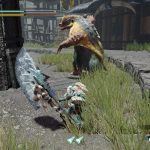



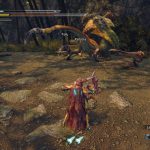
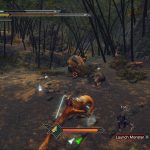
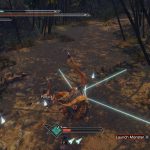

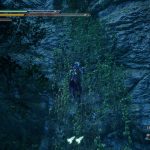
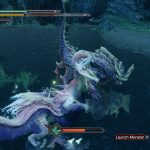

Monster Hunter Rise on the Nintendo Switch runs at lower graphics settings, has a 30 frames per second cap and barely scratches 720p resolution in docked mode and runs at 540p resolution in handheld mode. The art direction still shines through at these low resolutions, but terrain and overall environments can look flat on the Switch and the low-quality textures on the monsters themselves do stand out a bit.
The PC version of Monster Hunter Rise comes with its own set of graphical options. It doesn’t look as good as Monster Hunter World, but the art changes keep the game feeling fresh. The high resolution textures are a massive upgrade over the Switch version and you will notice other improvements, like higher quality foliage and rock surfaces, better lighting, depth of field, and the monsters themselves look noticeably better, particularly those with lots of scales or fur.
Monster Hunter World is still the more impressive game visually, but in the context of a Switch to PC conversion, the new version of Monster Hunter Rise does look nice. Combine that with the gameplay improvements, higher frame rates and faster exploration mechanics and I found myself enjoying this game much more than Monster Hunter World.
My main complaint here would be the in-game HUD, as Monster Hunter Rise uses a lot of large icons and text, which could do with being shrunk down a bit to avoid getting in the way of the spectacle of these fights. Perhaps this is something Capcom will tweak ahead of launch, or perhaps it will be something that modders will fix on PC at some point.
Capcom’s RE Engine has been built to deliver quality visuals at smooth frame rates on PCs and that continues to show here. My system isn’t particularly high-end by 2021 standards, I’m running an Intel Core i7-8700K, 16GB of RAM and a GTX 1080 Ti, with the game installed on a SATA SSD rather than a PCIe NVMe SSD. On my system, I can run Monster Hunter Rise at 2560×1440 with 150% resolution scale and maintain over 100 frames per second with no issues. Dropping the resolution scale to 100% nets me a clean 144 frames per second with V-Sync on, making the most out of my gaming monitor. With this level of performance, I’ll also be very interested to see how well this game runs on the Steam Deck in the months to come, as that system should offer better frame rates and visuals in a handheld formfactor compared to the Nintendo Switch.
This high, fluid frame rate, combined with the improvements to gameplay and exploration make Monster Hunter Rise a treat to play on PC. Like most Monster Hunter players, I do typically play with a controller, but I also ran through the tutorials and the Great Izuchi hunt using keyboard and mouse controls.
Recently, Capcom noted that it wants PC to be its main platform in the years to come and with this game, the publisher has also noted that it paid extra attention to ensuring good keyboard and mouse controls. The key bindings are indeed easy to get to grips with, using your mouse clicks for attacks, F to sheathe your weapon, space to dodge etc. If you don’t like controllers, or you simply don’t have one, you should have no problem playing this game efficiently with a keyboard and mouse without feeling like the controls are getting in the way of gameplay.
Monster Hunter Rise is coming to PC on the 12th of January 2022, followed by a major expansion ‘Sunbreak’ in Summer 2022. If you found Monster Hunter World a bit slow and cumbersome, I would recommend giving Rise a shot, especially on PC as the higher frame rate makes a huge difference. You can download the Monster Hunter Rise demo on Steam now.
Discuss on our Facebook page, HERE.
KitGuru Says: Have any of you tried Monster Hunter Rise on PC yet? What do you think of the PC version so far?
The post KitGuru Games: Monster Hunter Rise gets impressive PC upgrade first appeared on KitGuru.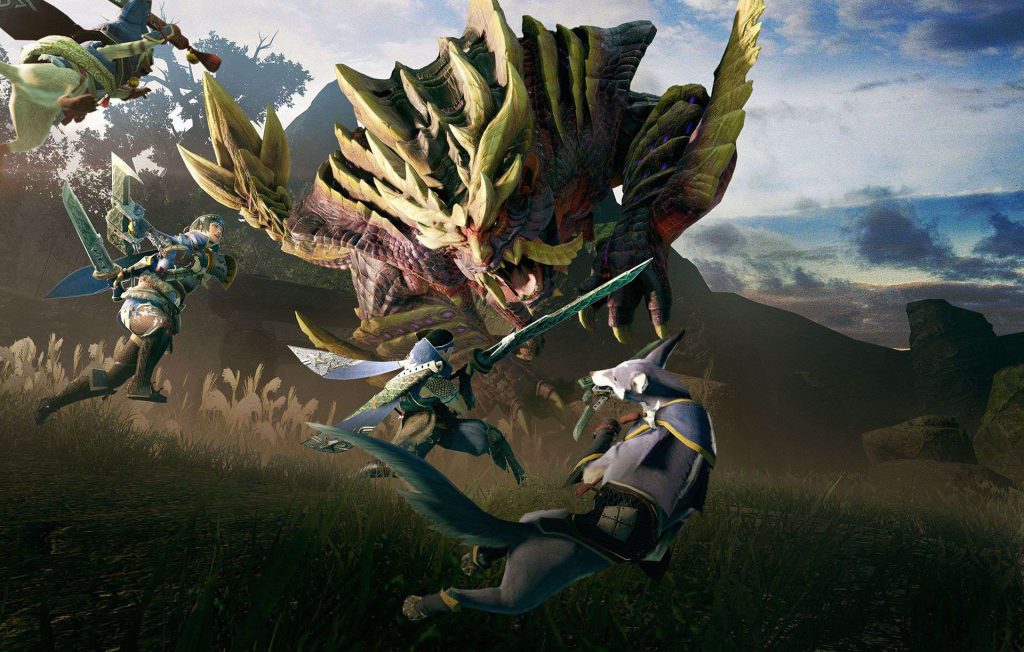
0 comments :
Post a Comment